Audi Q3 vs Hyundai Bayon – Differences & prices compared
Compare performance, boot space, consumption and price in one view.
Find out now: which car is the better choice for you – Audi Q3 or Hyundai Bayon?
The Audi Q3 (SUV) comes with a Petrol, Diesel, Petrol MHEV or Plugin Hybrid engine and Manuel or Automatic transmission. In comparison, the Hyundai Bayon (SUV) features a Petrol engine with Manuel or Automatic transmission.
When it comes to boot capacity, the Audi Q3 offers 530 L, while the Hyundai Bayon provides 411 L – depending on how much space you need. If you’re looking for more power, decide whether the 272 HP of the Audi Q3 or the 100 HP of the Hyundai Bayon suits your needs better.
In terms of consumption, the values are 1.70 L per 100 km for the Audi Q3, and 5.40 L for the Hyundai Bayon.
Price-wise, the Audi Q3 starts at 35100 £, while the Hyundai Bayon is available from 20100 £. Compare all the details and find out which model fits your lifestyle best!
Audi Q3
The Audi Q3 seamlessly blends practicality with luxury, making it an ideal choice for urban dwellers and adventure seekers alike. With its striking design and sophisticated interior, the Q3 offers a premium driving experience that caters to both comfort and style. As a compact SUV, it effortlessly navigates through city streets while providing ample space for passengers and cargo.
details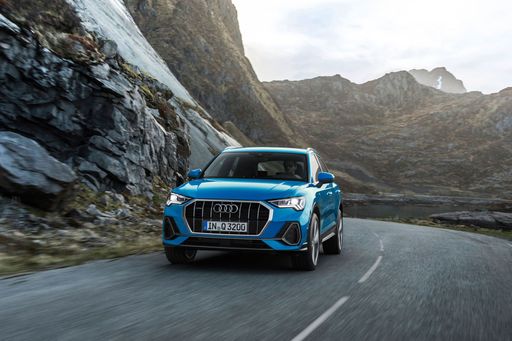 @ audi-mediacenter.com
@ audi-mediacenter.com
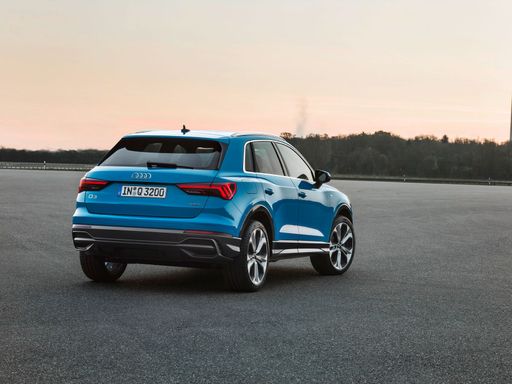 @ audi-mediacenter.com
@ audi-mediacenter.com
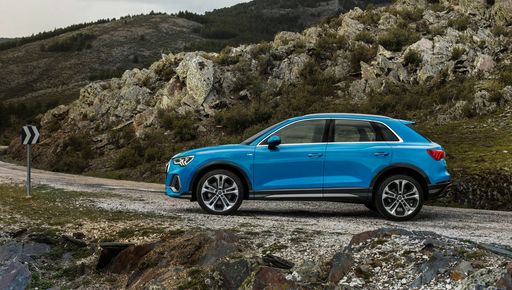 @ audi-mediacenter.com
@ audi-mediacenter.com
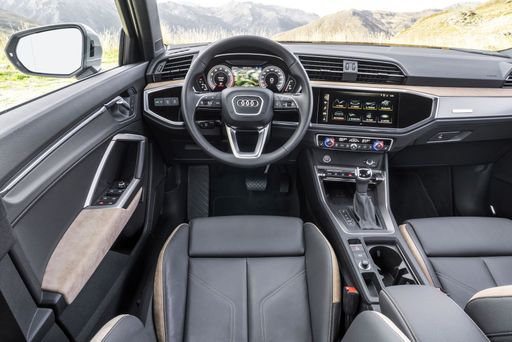 @ audi-mediacenter.com
@ audi-mediacenter.com
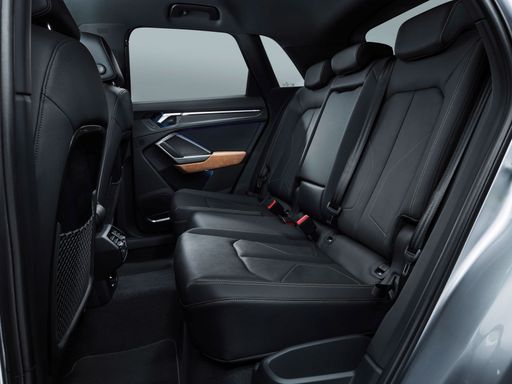 @ audi-mediacenter.com
@ audi-mediacenter.com
Hyundai Bayon
The Hyundai Bayon is a compact crossover that effortlessly merges practicality with modern design. Its sleek exterior and spacious interior make it an ideal choice for urban settings and longer journeys alike. With a focus on comfort and connectivity, this vehicle provides a smooth driving experience paired with advanced technology features.
details @ hyundai.news
@ hyundai.news
 @ hyundai.news
@ hyundai.news
 @ hyundai.news
@ hyundai.news
 @ hyundai.news
@ hyundai.news
 @ hyundai.news
@ hyundai.news

|

|
|
|
|
Costs and Consumption |
|
|---|---|
|
Price
35100 - 51300 £
|
Price
20100 - 25800 £
|
|
Consumption L/100km
1.7 - 8.6 L
|
Consumption L/100km
5.4 - 5.5 L
|
|
Consumption kWh/100km
-
|
Consumption kWh/100km
-
|
|
Electric Range
119 km
|
Electric Range
-
|
|
Battery Capacity
19.70 kWh
|
Battery Capacity
-
|
|
co2
39 - 195 g/km
|
co2
124 g/km
|
|
Fuel tank capacity
45 - 60 L
|
Fuel tank capacity
40 L
|
Dimensions and Body |
|
|---|---|
|
Body Type
SUV
|
Body Type
SUV
|
|
Seats
5
|
Seats
5
|
|
Doors
5
|
Doors
5
|
|
Curb weight
1525 - 1900 kg
|
Curb weight
1170 - 1195 kg
|
|
Trunk capacity
375 - 530 L
|
Trunk capacity
411 L
|
|
Length
4500 - 4531 mm
|
Length
4180 mm
|
|
Width
1843 - 1859 mm
|
Width
1775 mm
|
|
Height
1567 - 1601 mm
|
Height
1500 mm
|
|
Payload
455 - 535 kg
|
Payload
460 - 465 kg
|
Engine and Performance |
|
|---|---|
|
Engine Type
Petrol, Diesel, Petrol MHEV, Plugin Hybrid
|
Engine Type
Petrol
|
|
Transmission
Manuel, Automatic
|
Transmission
Manuel, Automatic
|
|
Transmission Detail
Manual Gearbox, Dual-Clutch Automatic
|
Transmission Detail
Manual Gearbox, Dual-Clutch Automatic
|
|
Drive Type
Front-Wheel Drive, All-Wheel Drive
|
Drive Type
Front-Wheel Drive
|
|
Power HP
150 - 272 HP
|
Power HP
100 HP
|
|
Acceleration 0-100km/h
5.7 - 9.5 s
|
Acceleration 0-100km/h
11.3 - 12.4 s
|
|
Max Speed
200 - 240 km/h
|
Max Speed
176 - 179 km/h
|
|
Torque
250 - 400 Nm
|
Torque
172 - 200 Nm
|
|
Number of Cylinders
4
|
Number of Cylinders
3
|
|
Power kW
110 - 200 kW
|
Power kW
74 kW
|
|
Engine capacity
1498 - 1984 cm3
|
Engine capacity
998 cm3
|
General |
|
|---|---|
|
Model Year
2025
|
Model Year
2024
|
|
CO2 Efficiency Class
E, G, F, B
|
CO2 Efficiency Class
D
|
|
Brand
Audi
|
Brand
Hyundai
|
Audi Q3
The Audi Q3 stands as a prime example of what modern compact SUVs can achieve, combining dynamic performance with cutting-edge technology and refined luxury. This versatile vehicle caters to a diverse audience, offering a range of engine options and innovative features that elevate the driving experience.
Engine Performance and Efficiency
The Audi Q3 impresses with its selection of powertrains, particularly the 2.0-litre turbocharged engines which are available in both petrol and diesel variants. With power outputs ranging from 150 PS to 245 PS, there's a model to suit varying performance needs.
Efficiency is also a highlight, with diesel variants achieving impressive fuel consumption figures as low as 5.5 L/100km. In contrast, petrol options balance power and economy, maintaining competitive consumption levels. Such efficiency is complemented by low CO2 emissions, making the Q3 a smart choice for eco-conscious drivers.
Transmission and Drive Options
Transmission options for the Audi Q3 include both manual and automatic gearboxes, including Audi’s advanced seven-speed S tronic dual-clutch transmission. This allows for swift gear changes and enhances driving dynamics. All-wheel drive is available on select models, providing superior traction and stability, especially in adverse weather conditions.
Technological Innovations
Stepping inside the Audi Q3 reveals a meticulously designed cabin outfitted with the latest technology. The Virtual Cockpit, a fully digital driver display, allows for extensive customisation of vehicle information. The infotainment system also integrates seamlessly with smartphone applications through Apple CarPlay and Android Auto, ensuring connectivity on the go.
Moreover, safety features like adaptive cruise control, lane assist, and a 360-degree camera add a layer of confidence for the driver, making every journey more secure.
Comfort and Space
Space is a defining characteristic of the Q3, which comfortably seats five passengers. The vehicle offers a generous boot capacity of 530 litres, making it practical for both daily commutes and weekend adventures. Additionally, the interior design exudes sophistication with premium materials and ambient lighting, creating an inviting atmosphere.
Pricing and Market Position
Starting at competitive pricing within its class, the Audi Q3 offers outstanding value, considering its extensive list of features and luxurious feel. Prices ranging from approximately €38,300 to €52,750 ensure that there's a model suited for various budgets, appealing to both entry-level buyers and those looking for top-tier specifications.
Conclusion
In summary, the Audi Q3 combines performance, technology, and luxury in a compact SUV design. With a variety of engine choices, advanced safety features, and a spacious interior, it caters to the needs of modern drivers. Whether you are navigating city streets or exploring the great outdoors, the Q3 proves to be an exceptional companion on the road.
Hyundai Bayon
Introducing the Hyundai Bayon: A New Era in Compact SUVs
The Hyundai Bayon, a compact SUV designed with urban adventurers in mind, is making waves with its exceptional blend of style, performance, and technology. The brand has pulled out all the stops to ensure that the Bayon stands out in the crowded SUV market, offering a vehicle that is both practical and innovative.
Sleek Design and Cutting-Edge Aerodynamics
The Bayon features a striking exterior design, characterised by its bold lines and angular shapes. With a length of 4180 mm, a width of 1775 mm, and a height of 1500 mm, the Bayon commands attention with its modern appeal and aerodynamic efficiency. These dimensions not only contribute to its sleek design but also enhance fuel efficiency, achieving an impressive 5.4 L/100 km.
Engine Performance and Specifications
Under the bonnet, the Bayon is powered by a 1.0-litre T-GDI petrol engine, delivering a robust 100 PS or 74 kW. This engine is available with either a manual or automatic gearbox, meeting varied driver preferences. The front-wheel-drive system complements its urban-centric design, ensuring a smooth and responsive ride.
Maximised Interior Space and Comfort
The spacious interior of the Bayon accommodates up to five passengers comfortably. The vehicle boasts a boot space of 411 litres, perfect for both everyday use and weekend getaways. The cabin is designed with practicality and technology in mind, with intuitive controls and ample storage options.
Advanced Technology and Connectivity
Hyundai has equipped the Bayon with state-of-the-art technology to enhance the driving experience. The SUV features a high-resolution touchscreen, offering seamless connectivity with Apple CarPlay and Android Auto. Safety is also a priority, with multiple driver assistance systems including lane-keeping assist and forward collision avoidance assist.
Environmental Efficiency
Despite its powerful performance, the Bayon achieves a respectable CO2 efficiency class of D, with emissions as low as 122 g/km. This balance between performance and environmental responsibility makes the Bayon an attractive option for conscientious drivers.
Affordability and Market Appeal
The Hyundai Bayon is competitively priced, ranging from €22,900 to €29,600. Its affordable running costs, estimated at 32.3 to 36.4 cents per kilometre, further enhance its appeal to budget-conscious consumers. With monthly costs ranging from €806 to €909, the Bayon provides excellent value without compromising on features or performance.
Final Thoughts
The Hyundai Bayon truly stands out in the compact SUV segment, combining style, innovation, and practicality in an appealing package. It offers a versatile driving experience suited to the demands of modern urban living, making it a top contender in its class. As Hyundai continues to champion forward-thinking design and technology, the Bayon is a testament to the company's ongoing commitment to excellence.
The prices and data displayed are estimates based on German list prices and may vary by country. This information is not legally binding.
